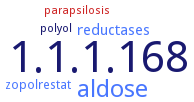1.1.1.168: 2-dehydropantolactone reductase (Re-specific)
This is an abbreviated version!
For detailed information about 2-dehydropantolactone reductase (Re-specific), go to the full flat file.

Reaction
Synonyms
(R)-pantoyl-lactone:NADP+ oxidoreductase (A-specific), 2-dehydropantoyl-lactone reductase, 2-dehydropantoyl-lactone reductase (A-specific), 2-ketopantoyl lactone reductase, AKR, CPR, ketopantoyl lactone reductase, NADPH-dependent aldo-keto reductase, NADPH-dependent conjugated polyketone reductase, reductase, 2-oxopantoyl lactone
ECTree
Advanced search results
Temperature Stability
Temperature Stability on EC 1.1.1.168 - 2-dehydropantolactone reductase (Re-specific)
Please wait a moment until all data is loaded. This message will disappear when all data is loaded.
30 - 50
the residual activity of recombinant enzyme maintains above 90% of the initial activity after 7 h at 30°C. When the enzyme is incubated at 50°C, above 30% of the initial activity still retains after 2 h. The recombinant enzyme exhibits adequate thermal stability, and its half-lives are 45.6, 8.6 and 1.7 h at 30, 40 and 50°C, respectively
40 - 50
the recombinant enzyme exhibits high thermal stability with half-lives of 6.3 h, 3.7 h and 52 min at 40, 45 and 50°C, respectively


 results (
results ( results (
results ( top
top






